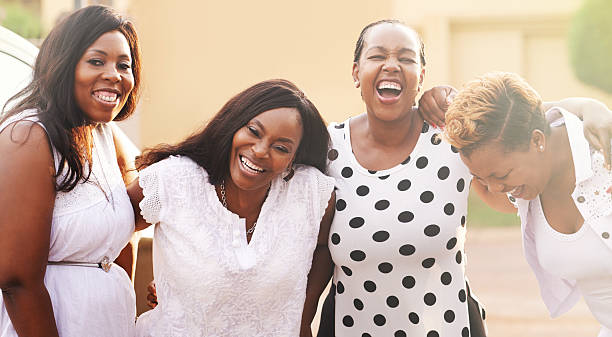Growing up as a woman and especially a Nigerian woman, there are two statements that you get accustomed to hearing and they are said right from childhood. The first: Is this how you would behave in your husband’s house?. The second: What if your husband doesn’t like it?
Women and girls often hear variants of the above two throughout our lifetimes.
It can come when a seven year old girl makes a remotely unrelated mistake such as losing a lunchbox in school and she gets asked if she would lose things like that in her husband’s house.
It can also come again in remotely unrelated things like when a woman decides to cut her hair and she gets asked how her husband would feel about it. This particular example is so bad that some women with lowcuts have reported being asked to bring letters of permission from imaginary husbands to barbing salons before their hair is cut.
But what is the essence of all this? The downside of raising women to put men’s needs and wants before ourselves, is that women make important life decisions as though men and in particular imaginary husbands are regarding them with a whip in hand and a mocking sneer on his face.
To put it simply, a girl who has had dreams of being an astronaut or pilot would think of how her future chances of being a wife and mother would reduce if she truly goes for her heart desires.
A girl who wants to be a journalist, would worry about being seen as “loud” and “domineering” and won’t see that being a journalist exposes one to power that can act as a form of protection even for a woman.
How many dreams of women have been lost to expectations of wifehood and motherhood? How many young girls choose “lesser” celebrated paths because that would mean less scrutiny for them? How many women have even held off on doing important things like buying a house, a car and travelling solo because they are scared even with money, that these things make them “manly” and less desirable?
To better understand the harm that comes with encouraging women to plan lives around often imaginary husbands and partners, I spoke to six women.
For Eunice, a writer and social media manager, her own shaming has mostly been around housework. She said: “My own case was more about household stuff. For instance, I don’t really like eating beans but my mum finds a way to ensure that I cook beans because: ‘What if my husband likes beans?’. Mind you I have a younger brother who can cook beans and likes to eat it. But still my mum finds a way to drag me into cooking beans. Why can’t she let the boys cook beans since they like it?”.
She went on to say: “Another instance was when I was much younger and my parents asked me to use my hands to dice pepper and tomatoes. I complained that dicing pepper usually made my hands hot and pepperish and I’d prefer we got a manual blender or just go to blend the pepper outside. And they said ‘What if your husband cannot afford to buy a blender, won’t you eat pepper?’. Bruh I shed tears. Anyway, I diced the pepper and tomatoes and had to use nylon to protect my hands.”
It is not only Eunice that has had to deal with parents being difficult around food particularly as it concerns husbands. Another woman called Christine* said: “During my seafood allergy episode, my mum would tell me, what will I do if my husband likes crayfish? I should better learn to eat it. This was after I once ate crayfish and shrimps and was vomiting through my mouth and nose.”
For Elohor, a writer and editor, her shaming came mostly from her mother. It is also interesting and worthy of note, that most times it is mothers and women who do most of the shaming and husband policing. Elohor said: “When I would do some house chores wrong as a child, my mother would always say: ‘Tomorrow now your husband will insult me, that I did not train you well.’
It was never about survival skills, just an imaginary man somewhere.
Oh! And one time my mother fought with me because I said I wouldn’t call my husband: ‘My Lord.’ Husband wey I never see o! We quarrelled that day no be small.
I personally think it’s bullshit.”
Some women also shared stories of parents blocking career progression for them because it would make them look less desirable. For Ebun*, she shared that recently her mother told her not to get a PhD because she’s not married yet and no man will want to marry anybody with higher certifications than him.
Ebun went on to say: “Because I’m not in a relationship yet, I felt my ambition could be a reason I’m not in one. I was troubled and felt like, I won’t do a PhD but right now I don’t care.”
For writer Aisha, her own husband policing and career impediment came from her dad. She told me: “My dad said I should not study international relations or pursue a career because I’ll be travelling too much to care for the home.
When my mother suggested he help with an internship at UNICEF(he works with them and has friends there), he disagreed and said I would be too busy travelling and would become a problem when I married.”
Sometimes, even daughters with relatively progressive parents fall victim to being asked not to do things because an imaginary husband may not like it. This has been the case with Tolulope* and Chioma.
Tolulope said: “Although my mum has not really been the type to say “your husband’s house” this and that, she’s always given subtle hints of how patriarchy is so much in our subconscious.
She’d say stuff like: ‘Why are you doing this, as a woman? Don’t you know you’re a sisi, you should be bla bla BLA’.
Tolulope went on to say: “One that really annoyed me was when both my parents were listening to me talk about my leg chain and then I mentioned having a piercing in passing, piercing my nose or something and then my mum said: ‘Well, that’s fine as long as your husband agrees’.
Angel, I didn’t go crazy but I went crazy because what the fuck do you mean if my husband “ALLOWS” me. Why are my dos and don’ts tied around a man, my entire existence, tied around a man. Lmao. Why does anybody need to “allow” me to do stuff to adorn myself?”
In Chioma’s case, her educated mother told her not to pursue education so much because a husband may not want her.
Chioma said: “I have had so many statements made that at some point, I asked myself if it was really necessary to get married if I was going to be a slave to someone’s desires and wishes. All that has changed.
I remember this one time I was talking to my mum about doing my PhD in the future and my mum said: ‘Won’t you be in your husband’s house by then? Will you really need it?’ I was in shock, because my mum is really educated (proof that even education doesn’t end this mindset).
She went on to narrate how her weight too has come under scrutiny as one which will make her less desirable for a husband saying, “Other times, because of my weight gain, one of my uncles told me: ‘This one you are fat like this, you won’t find a man to marry you oo’. If he had said; ‘This weight gain is not good for your health’ or something, I would have understood. But relating it to a man??? Seriously!! My whole life is for a man”.
It is of utmost importance that women and young girls especially are raised to see their worth not through a man’s eyes but first through their humanity and the value they bring to a community.
If this isn’t done, we would continue to have cases of mothers willing to ignore the abuse stories of their daughters, all so they can say that they have husbands.
*Names changed to protect identities.

Angel Nduka-Nwosu is a writer, journalist and editor. She moonlights occasionally as a podcaster on As Angel Was Sayin’. Catch her on all socials @asangelwassayin.

